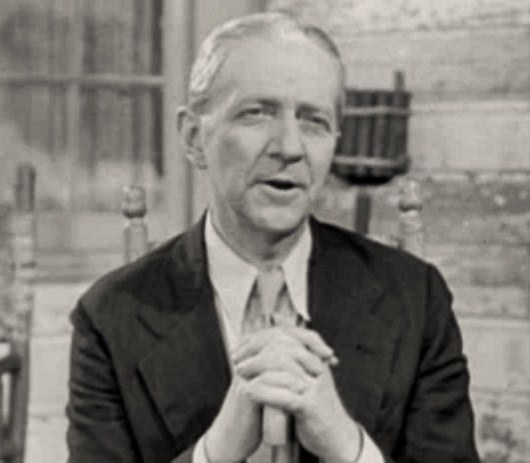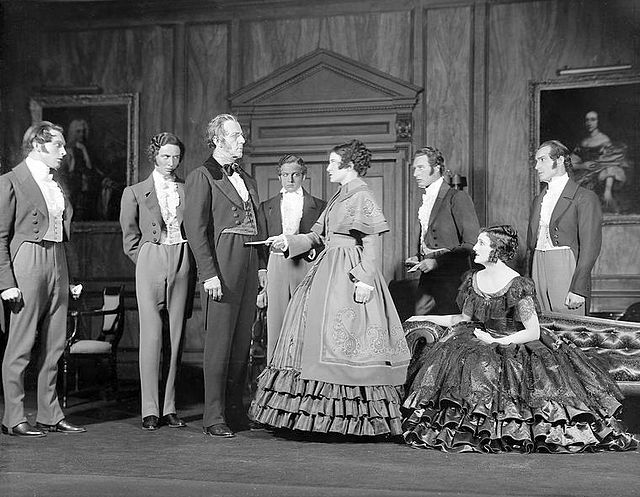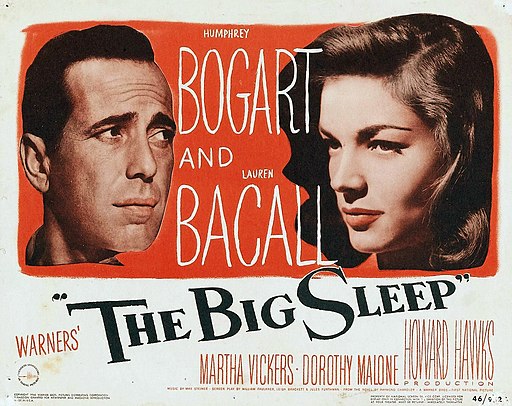Charles Waldron
back| Full Name | Charles Dieudonné Waldron |
| Stage Name | Charles Waldron |
| Born | December 23, 1874 |
| Birthplace | Waterford, New York, USA |
| Died | March 4, 1946 |
| Buried | Forest Lawn Memorial Park, Glendale, California, USA |
| Married to | Mildred Seaton (also known as Mildred Seaton Denny), married 1907, died 1946 |
| Children | Charles Waldron Jr. |
| Notable films | The Sea Hawk (1940) - Sergeant York (1941) - Across the Pacific (1942) - The Hard Way (1943) - Notorious (1946) |
Charles Waldron
The Reliable Veteran
Charles Dieudonné Waldron embarked on an acting career that spanned several decades and included significant work on both stage and screen. Waldron was a versatile actor known for his roles in various genres, from drama to adventure.
Waldron's career began in the theater, where he honed his craft and gained recognition for his strong presence and acting skills. He eventually transitioned to the silver screen, where he became a familiar face in Hollywood films.
Related
Charles Waldron (1874 – 1946)
Biography, Career and all his Movies
Charles Dieudonné Waldron was born on December 23, 1874, in Waterford, New York, a small town nestled along the Hudson River. Growing up in the post-Civil War era, Charles was exposed to the dynamic cultural shifts of America during the late 19th century. His parents, whose names remain largely undocumented, supported his early interest in the arts. As a young boy, Charles showed an inclination towards storytelling and performance, often participating in local theater productions.
Path Towards Success
Waldron’s passion for acting led him to pursue formal training in the dramatic arts. He started his career on the stage, performing in various theater companies across the United States. His early years were characterized by hard work and dedication, traveling extensively and honing his craft in a wide range of roles. The turn of the century was a fertile period for American theater, and Waldron quickly established himself as a versatile and reliable actor.
By the 1910s, Charles Waldron had transitioned to the burgeoning film industry. His experience on stage provided a solid foundation for his screen performances, allowing him to bring depth and nuance to his roles. He made his film debut in the silent era, appearing in numerous productions that showcased his range as an actor. His strong stage presence and expressive abilities made him a natural fit for the silver screen, and he quickly gained recognition in Hollywood.
Marriages and Family Life
In 1907, Charles Waldron married Mildred Seaton, an actress known for her own contributions to theater and film. Their marriage was one of mutual respect and shared passion for the performing arts. Mildred, also known as Mildred Seaton Denny, was a supportive partner throughout Waldron’s career, often accompanying him to various film sets and theatrical productions. The couple had one child, a son named Charles Waldron Jr., who would later follow in his father’s footsteps in the entertainment industry.
Career Highlights
Waldron's career spanned over three decades, during which he appeared in numerous films that are now considered classics. One of his standout roles was as Sir John Burleson in The Sea Hawk (1940), where he brought a commanding presence to the screen. His portrayal of Pastor Pile in Sergeant York (1941) was another highlight, showcasing his ability to convey sincerity and moral authority.
In Across the Pacific (1942), Waldron played Dr. Lorenz, a role that allowed him to explore more complex character dynamics. His performance in The Palm Beach Story (1942) as Mr. Hinch demonstrated his versatility, adding a touch of humor to his repertoire. In The Hard Way (1943), he depicted Mr. Roberts with a blend of gravitas and empathy.
Waldron's final film role was in Alfred Hitchcock's Notorious (1946), where he played the Commodore. This performance was a fitting capstone to his career, allowing him to work under one of the greatest directors of the time.
Passions and Interests
Outside of his professional life, Waldron was known for his intellectual curiosity and love of literature. He was an avid reader, often immersing himself in classic novels and contemporary works alike. His deep appreciation for storytelling extended beyond his acting career, influencing his approach to his roles and his interactions with fellow actors and directors.
Waldron was also passionate about mentoring younger actors. He believed in the importance of nurturing talent and often provided guidance and support to aspiring performers. His colleagues remembered him as a generous and kind-hearted individual, always willing to share his knowledge and experience.
Death and Legacy
Charles Waldron passed away on March 4, 1946, at the age of 71. The cause of his death was attributed to complications from a heart condition. His passing marked the end of an era for many who had come to admire his work both on stage and on screen. Waldron was laid to rest at Forest Lawn Memorial Park in Glendale, California, a place that has become the final resting spot for many Hollywood legends.
Waldron’s legacy lives on through his extensive body of work, which continues to be celebrated by film enthusiasts and historians. His contributions to both theater and film have cemented his place in the annals of American entertainment history. Charles Waldron is remembered not only for his remarkable talent and versatility but also for his dedication to the craft of acting and his enduring impact on the industry.
All Actors who Passed Away in 1946:
Versatility and Range
Waldron’s acting style was marked by his incredible versatility. Whether playing a stern authority figure, a compassionate mentor, or a duplicitous villain, he brought depth and nuance to his characters. This range was a testament to his extensive theater background, where he played diverse roles that demanded different emotional and physical expressions. On screen, his adaptability enabled him to transition seamlessly between genres, from drama and romance to comedy and thriller.
Commanding Presence
A key element of Waldron’s style was his commanding stage presence. He had a natural gravitas that drew audiences’ attention, making his characters memorable even in smaller roles. This presence was not just about physicality but also about the way he carried himself and delivered his lines. Waldron had a clear, authoritative voice that conveyed confidence and intelligence, which was particularly effective in roles that required leadership or moral authority.
Subtlety and Nuance
Waldron excelled in bringing subtlety to his performances. Rather than relying on overt dramatics, he used restrained facial expressions and body language to convey his characters' inner lives. This understated approach made his performances more realistic and relatable. For example, in Sergeant York (1941), his portrayal of Pastor Pile was marked by a gentle, yet firm demeanor that provided a moral anchor for the film’s protagonist.
Emotional Depth
One of Waldron’s strengths was his ability to infuse emotional depth into his characters. He had a talent for tapping into a wide range of emotions, from joy and sorrow to fear and anger, often within a single performance. His emotional authenticity helped to create a strong connection with the audience. This was evident in films like The Sea Hawk (1940), where his character Sir John Burleson exuded both authority and empathy.
Attention to Detail
Waldron was known for his meticulous attention to detail in crafting his characters. He paid close attention to the nuances of dialogue delivery, gestures, and interactions with other characters. This thorough preparation ensured that his performances were not only believable but also layered with meaning. His roles often felt lived-in and real, a testament to his dedication to the craft.
Collaboration and Adaptability
Throughout his career, Waldron demonstrated a strong ability to collaborate with directors and fellow actors. He was adaptable, able to adjust his performance based on the demands of the scene and the vision of the director. This collaborative spirit was especially important in ensemble casts, where his ability to play off other actors' performances enhanced the overall cohesion and impact of the film.
Legacy and Influence
Waldron’s acting style influenced many contemporaries and successors. His approach combined the disciplined techniques of classical theater with the evolving demands of cinematic storytelling. His ability to balance theatrical expressiveness with screen realism helped bridge the gap between stage and film acting, setting a standard for future actors transitioning between the two mediums.
In summary, Charles Waldron's acting style was characterized by versatility, a commanding presence, subtlety, emotional depth, attention to detail, and a collaborative spirit. These qualities made him a standout performer in both theater and film, leaving a lasting legacy in the entertainment industry. His ability to adapt to various roles and genres, while maintaining a consistent level of excellence, remains a hallmark of his distinguished career.
Awards and Recognition:
Charles Waldron, while a prominent actor of his time, did not receive notable awards or nominations during his career. This was partly due to the period he was active in; the major film awards and industry recognitions, such as the Academy Awards, were still in their infancy or had not established categories that would have recognized his body of work.
Career Highlights and Legacy
Despite the lack of formal accolades, Waldron's contributions to cinema were significant. He is remembered for his roles in various important films, such as "Sergeant York" (1941), "The Sea Hawk" (1940), and "Notorious" (1946), which showcased his versatility and talent. His final role in "The Big Sleep" (1946), where he played General Sternwood, remains one of his most memorable performances and solidified his legacy in Hollywood.
Notable Films and Contributions
- "The Sea Hawk" (1940) - As Sir John Burleson, Waldron played a key role in this swashbuckling adventure about a privateer fighting against the Spanish Armada.
- "Sergeant York" (1941) - His portrayal of Pastor Pile provided a moral compass for the film’s protagonist, demonstrating his ability to imbue characters with depth and sincerity.
- "Notorious" (1946) - As Commodore, Waldron's performance added gravitas to Alfred Hitchcock's espionage thriller.
- "The Big Sleep" (1946) - Waldron's final film, where he played General Sternwood, a role that has since become iconic.
Memorable Film Lines from Charles Waldron:
· "The Big Sleep" (1946):
General Sternwood: "My respects to you, sir. Few men ever swapped more than one shot with Sean Regan."
· "The Real Glory" (1939):
Padre Rafael: "The drug that keeps them going is what keeps most of us going - faith - good or bad! The juramentado believes that when he kills an infidel, it is a passport to Heaven."
· "The Song of Bernadette" (1943):
Bishop of Tarbes: "I wonder, my dear Peyramale, who will win - the Emperor or the Lady?"
Movies featuring Charles Waldron:
1934
"Sadie McKee" - Charles Waldron plays a supporting role in this romantic drama about a young woman, Sadie McKee, who rises from poverty to wealth, encountering love and heartache along the way.
1935
"Broadway Melody of 1936" - Waldron appears in this musical comedy that follows a Broadway producer trying to put on a show while dealing with a love triangle and the schemes of his competitors.
"The Casino Murder Case" - Waldron portrays Herbert Ogden in this mystery film based on S.S. Van Dine's novel, where detective Philo Vance investigates a series of murders connected to a wealthy family.
"Go Into Your Dance" - He plays a minor role in this musical film about a vaudeville dancer who teams up with a nightclub singer to make a comeback.
"Don't Bet on Blondes" - Waldron appears in this romantic comedy about an insurance agent who specializes in policies for risky bets, especially those involving a beautiful blonde actress.
1936
"Sutter's Gold" - Waldron has a minor role in this historical drama about John Sutter, whose land and gold discovery in California led to the famous Gold Rush.
"Murder with Pictures" - He plays District Attorney Lester Ashton in this mystery film about a newspaper photographer who gets involved in a murder case.
"Libeled Lady" - Waldron appears in this screwball comedy about a newspaper editor, his fiancée, and a socialite suing the paper for libel.
1937
"The Devil Is Driving" - Waldron plays a supporting role in this crime drama about a taxi driver who becomes involved in a series of criminal activities.
"Mountain Justice" - He appears in this drama about a young woman fighting against the oppressive laws and customs of her Appalachian community.
"It's Love I'm After" - Waldron has a minor role in this romantic comedy about a stage couple whose off-stage romance is as dramatic as their on-stage performances.
"Night Club Scandal" - He portrays Dr. Kildare in this mystery film about a nightclub singer who becomes involved in a murder investigation.
1938
"Love Is a Headache" - Waldron appears in this comedy about a Broadway star who adopts two children to improve her image, only to face unexpected challenges.
"Vivacious Lady" - He plays a supporting role in this romantic comedy about a botany professor who impulsively marries a nightclub singer.
"Four Men and a Prayer" - Waldron appears in this adventure film about four brothers who investigate their father's mysterious death and uncover an international conspiracy.
"The Girl of the Golden West" - He plays a supporting role in this musical Western about a saloon owner and a notorious outlaw who fall in love.
"The Sisters" - Waldron has a minor role in this drama about three sisters navigating love and life in the early 20th century.
"Too Hot to Handle" - He appears in this adventure film about rival newsreel reporters competing for a big story.
1939
"Tell No Tales" - Waldron plays District Attorney Curtis in this crime drama about a newspaper editor who gets involved in solving a kidnapping case.
"Maisie" - He appears as Mr. Reed in this comedy about a brassy showgirl who finds herself in various misadventures.
"Mr. Smith Goes to Washington" - Waldron plays a minor role in this classic film about a naïve young senator who fights corruption in Washington, D.C.
1940
"The Sea Hawk" - Waldron portrays Sir John Burleson in this swashbuckling adventure about a privateer fighting against the Spanish Armada.
"Brother Orchid" - He appears as Brother MacDonald in this crime comedy about a gangster who hides out in a monastery to avoid his rivals.
"Foreign Correspondent" - Waldron plays a supporting role in this Alfred Hitchcock thriller about a journalist covering pre-World War II events in Europe.
"The Mummy's Hand" - He appears as Professor Norman in this horror film about an expedition searching for a mummy's tomb.
1941
"The Great Lie" - Waldron plays a supporting role in this drama about a concert pianist who becomes involved in a love triangle.
"Sergeant York" - He portrays Pastor Pile in this biographical film about Alvin York, a pacifist-turned-war hero during World War I.
"The Sea Wolf" - Waldron has a minor role in this adventure film about a writer and a fugitive who are rescued by a brutal sea captain.
1942
"The Male Animal" - He plays Dean Frederick Damon in this comedy about a college professor who stands up for his beliefs.
"The Palm Beach Story" - Waldron appears as Mr. Hinch in this screwball comedy about a woman who divorces her husband to help him succeed.
"Across the Pacific" - He portrays Dr. Lorenz in this wartime thriller about a soldier uncovering a Japanese plot against the Panama Canal.
"Sherlock Holmes and the Secret Weapon" - Waldron plays Sir Reginald Bailey in this mystery film where Sherlock Holmes foils a Nazi plot.
1943
"The Hard Way" - Waldron appears as Mr. Roberts in this drama about two sisters striving for success in the entertainment industry.
1944
"The Seventh Cross" - He plays a supporting role in this war drama about an escapee from a Nazi concentration camp.
1945
"Pride of the Marines" - Waldron has a minor role in this biographical film about a Marine who becomes a hero during World War II.
1946
"Notorious" - His final film role was as Commodore in this Alfred Hitchcock thriller about an espionage plot involving Nazi war criminals.



